Illinois Baptist
Nate AdamsP.
Plus: Ministry ideas on page

P.
Plus: Ministry ideas on page

After governor limits sizes of group meetings, and people begin staying home
Illinois | Some are already calling it “the new normal,” but doing ministry in a time of social distancing, canceled group meetings, and intentional isolation is hardly normal. Church leaders awoke to this reality Sunday, March 15, after health officials announced the first confirmed cases of COVID-19 (Coronavirus) outside the Chicago metro area, and urged limits on public groups larger than 50.

For many churches, that meant canceling services, the possibility of an extended period of no public gatherings, and the need for alternative worship delivery methods. What remains unclear in this sudden escalation of the Coronavirus pandemic and its accompanying fears is what ministry will become when human contact is risky.


With schools closed and restaurant service limited, pastors are asking hard questions about the kinds of ministry their churches might offer to their usual constituencies— the sick, home bound, and children. And how safe is it?
Many IBSA churches joined congregations around the world in going online March 15 in an effort to mitigate the spread of COVID-19.

“For precautionary reasons, all services from March 15 to March 21 have been canceled,” Rochester First Baptist Church posted on its Facebook page. The Springfield-area congregation, like many in the region, had been planning to hold in-person services until health officials announced Sangamon County’s first confirmed cases of COVID-19 on March 14.

Churches are now likely to limit gatherings for much longer than a week, after a recommendation by the Centers for Disease Control and Prevention (CDC) urging Americans not to gather in groups of 50 or more for eight weeks. Previously, Illinois Gov. J.B. Pritzker had announced a ban on all public events over 1,000 people until May 1.
The stricter guidelines from the CDC will force many churches to consider how several weeks of no in-person meetings will impact giving, fellowship, and mission.
IBSA Schedule Changes
All IBSA events through March 31 are postponed, including:



Children’s Missions Day 3/21
VBS Clinic 3/28
Training Night 3/31
Church groups’ visits to IBSA camps are canceled through April 30.
Priority Annual Women’s Conference has not been changed as of press time, although the situation is fluid. Online alternatives are being explored.
WISDOM
C.S. Lewis
The lion, the witch, and the germaphobe
P. 4
RELIGIOUS FREEDOM
Witnessing aloud City admits limitations illegal
P. 6
REAL LIFE
Man’s best friend
Tennessee watchdog is a lifesaver
P. 10
Editor - Eric Reed
Managing Editor - Meredith Flynn
Graphic Designer - Kris Kell
Contributing Editor - Lisa Misner
Administrative Assistant - Leah Honnen
The general telephone number for IBSA is (217) 786-2600. For questions about subscriptions, articles, or upcoming events, contact the Illinois Baptist at (217) 391-3119 or IllinoisBaptist@IBSA.org


The Illinois Baptist is seeking news from IBSA churches. E-mail us at IllinoisBaptist@IBSA.org to tell us about special events and new ministry staff.

POSTMASTER: The Illinois Baptist is owned and published every three weeks by the Illinois Baptist State Association, 3085 Stevenson Drive, Springfield, Illinois 62703-4440. Subscriptions are free to Illinois Baptists. Subscribe online at IBSA.org.

Location: Bowmanville
Focus: Families
Characteristics: On Chicago’s north side, Bowmanville is a quiet haven between busier neighborhoods, with the convenience of nearby retail, restaurants, and major thoroughfares.
Prayer needs: A new church to engage Bowmanville.
– IBSA Church Planting Team
Snapshots from the world of Illinois Baptists
Pack a pew
The majority of U.S. churchgoers take someone along with them, according to LifeWay Research. But few attend with someone outside their family.
When you attend church, who typically travels with you?
54% My spouse
31% My children
18% 11% 4% 3% 19%
Another family member Friend or acquaintance
My grandchild
Someone from church who lacks transportation No one; I travel by myself.
– LifeWay Research, Feb. 2020
the cooperative program

Giving by IBSA churches as of 1/31/20
1,109,432
Budget Goal: $1,211,539
Received to date in 2019: $1,251,851
2020 Goal: $6.3 Million
NATE ADAMSDon’t shake hands with others. Wash your own hands, frequently and for at least 20 seconds. Practice social distancing. Stay away from most people, but especially people who seem sick. Avoid large public gatherings. Don’t travel. In fact, stay home if you can. Oh, and please don’t touch your face.
That last instruction is especially frustrating because, after hearing all the others, the first thing you want to do is bury your face in your hands. Yet these commands are necessary precautions we are all learning to live with, as the Coronavirus (COVID-19) spreads across our nation, bringing with it fear and anxiety to many.
With confidence in God’s care and providence, Christians possess the faith, hope, love, and blessed assurance to face all fears. At the same time, many of these new precautions that are designed to protect our physical health may now also require us to rethink some of our church practices and traditions.
For example, how does a church enjoy fellowship without handshakes, hugs, and shared meals? How does a church worship without public gatherings, or share communion while practicing social distancing? How does a church minister while staying away from the sick? And how does a church do missions without traveling? Let’s face it, the church was not intended or designed for isolation and withdrawal.
One of the phrases used frequently right now as organizational leaders explain their various decisions is “an abundance of caution.” It’s a reassuring phrase. It promises to do more than may even be necessary to make sure things are safe. And certainly, an abundance of caution is an appropriate standard when working together to protect our public health.
But for churches during this season, there is also an abundance of opportunity. The above questions, while challenging, give us an opportunity to think differently about how to fulfill the purposes of the church, even when our normal patterns and practices are preempted.
Instead of asking the above questions in exasperation, let’s ask them with excitement and creativity. How can we innovatively express fellowship during these days? How can we worship together, even if we can’t all be together? How can we minister lovingly to the sick from a distance, perhaps even more effectively than in person? Are there ways to be on mission, even with travel restrictions?
I believe there are positive, even powerful answers to questions like these. When someone from my Bible study or small group calls me and asks how he can pray for me, I feel fellowship, perhaps even more than I did during the last group meeting. If my church’s worship services are cancelled for public health reasons and a group works hard to help us worship online, I feel motivated to worship with a new sense of victory and enthusiasm. And when I ask my neighbors how they’re dealing with the anxiety of the Coronavirus, and share with them how I’m dealing with it and how I know the God who is helping me, perhaps I’m more on mission than I was willing to be when crisis wasn’t on the doorstep.
Underground churches in places like China and North Korea have had to ask some of these hard questions about how to be the church in spite of adversity for decades, even generations. And creative, growing churches often ask these questions, simply to be more effective or to reach more people. They may turn to technology, or partnerships, or new methods, or old methods deployed in new ways. But churches determined to fulfill their biblical purposes will demonstrate both creativity and resolve, no matter what obstacles or fears they face.
Nate Adams is executive director of the Illinois Baptist State Association. Respond at IllinoisBaptist@IBSA.org.

We can respond to this crisis with creativity, resolve, and a renewed sense of purpose.
Continued from page 1
During the first weekend of limited gatherings, churches scrambled to create worship alternatives. Many kept the number of people in church buildings small, and live streamed worship services online. Those that held inperson services worked to assure churchgoers of increased precautions, like canceling the customary greeting time or donut table. Many churches spent extra time and resources cleaning facilities prior to the Sunday service.
Public health officials have signaled “normal” life may not return to the U.S. for a while. But Christians, while acknowledging the fear and stress brought on by the pandemic, have hope rooted in unshakable faith, Marion pastor Michael Nave said in a video posted on his church’s Facebook page.
“Straight from the lips of Jesus: ‘Let not your heart be troubled. You believe in God; believe also in me.’ Those were his words to his disciples when things were about to get crazy in their lives. Those are his words for us in a crazy time like right now.”
Nave’s church, Cornerstone, moved services online. Nave told his congregation he would be preaching from Isaiah 41 on the hope we have in faith. “When we’re facing chaos, when we’re facing times of craziness, God is inviting us—even commanding us— helping us to have faith in the midst of that fear.”
Southern Baptist Convention leaders called more than 47,500 SBC churches to prayer on March 15, for an end to the pandemic, for government leaders, and for missionaries serving around the world. The International Mission Board has asked U.S. mission teams to forego international travel until at least April 30.
The Southern Baptist Convention Executive Committee, charged with planning the denomination’s annual summer meeting, announced plans for the June 9-10 event in Orlando are still in place, although a provision in the SBC Constitution allows the meeting to be canceled or held in a different location. “This provision would only be considered in an extreme circumstance,”
the Executive Committee said March 6. As churches navigate the COVID-19 crisis, several resources are aimed at helping leaders prepare their congregations for the virus. Wheaton College’s Humanitarian Disaster Institute has published a COVID-19 Church Planning Template at wheaton.edu. LifeWay Christian Resources has developed pandemic response resources available for free at MinistryGrid.com/coronavirus.
LifeWay also created a free children’s ministry supple ment for parents and caregivers leading a home Bible study in lieu of Sunday school. “LifeWay Kids at Home” includes video content, downloadable activity sheets, and Bible teaching plans. The material is accessible at my.lifeway. com/redeem, with the redemption code: VZMD4SSQ38 (which churches are free to dis tribute).
For links to more church and ministry resources related to the COVID-19 response, go to IllinoisBaptist.org/covid-19statement and IBSA.org/church-helps.
– Illinois Baptist, with additional reporting from Baptist Press

Volunteers asked to forego travel
Springfield | IBSA has postponed three international mission trips in response to the COVID-19 pandemic. Trips to Jamaica, Asia, and London have been delayed until later in the summer in hopes the virus will decline with warmer temperatures, said Brad Lovin, IBSA’s administrative director of mobilization.

“These decisions are meant to ensure we steward resources and time well for international missions,” Lovin said. “IBSA will continue to monitor developments related to the COVID-19 outbreak to further adjust mission opportunities in consideration of health and safety risks.”
The Southern Baptist International Mission Board (IMB) is encouraging all mission volunteers from U.S. churches to postpone international mission-trip travel through April 30 at least. This date could be extended and will be reevaluated by April 15, IMB said “This situation is changing moment-by-moment,” said IMB President Paul Chitwood. “We just don’t know where a group might be delayed or which countries may not allow international travelers to enter or exit.
“We’ve already had to cancel several overseas meetings due to sudden travel bans and challenges associated with government-imposed quarantines. This recommendation for delayed mission-trip travel is temporary, but we believe it is necessary at this time.”
The North American Mission Board (NAMB) has postponed all events until April 30, and suspended staff and missionary travel until the same date. Churches and individuals that had signed up for a NAMB mission trip through April 30 were notified those trips have also been postponed.
On March 11, President Donald Trump announced a ban on most travel to the U.S. from much of Europe. Trump has since expanded the travel ban to include the United Kingdom and Ireland, and has advised Americans against unnecessary travel.
Even before IMB’s travel announcement, the missions agency had appointed a task force to communicate with field personnel and church mission teams about COVID-19. In a press release, IMB said the group will make recommendations to churches based on personal health risks, risks of spreading the virus, and the possibility of quarantine or delay by local governments including the U.S.
“We are thankful for the churches that partner with our IMB personnel around the world. The churches and their mission teams are vital to our work,” Chitwood said. “This is an unusual time for all of us, but we know that God is sovereign and that his work will not be stopped by this virus.”
– Illinois Baptist, with information from IMB and NAMB







An Alabama pastor and 12 members of his church entered self-quarantine after returning to the U.S. from Israel. The group from 3Circle Church in Fairhope, Ala., was on a tour of the Holy Land when they were quarantined and tested for coronavirus after a person staying at their hotel in Beit Jala tested positive for the virus. Pastor Chris Bell reported March 9 the group’s tests were negative for the virus.
CHRIS BELL“We went straight from the airport to quarantine,” he said. “It’s not just about us; it’s about protecting other people and making sure that we do this right and responsibly.”
All six Southern Baptist seminaries have moved classes online in response to Coronavirus. Midwestern, New Orleans, Southeastern, Southern, and Southwestern Seminaries will continue the remainder of the spring 2020 semester online. Gateway Seminary will not hold in-person classes from March 16-29.
“Right now,” said Southern Seminary President Albert Mohler, “love of neighbor means that we’re going to have to interrupt the way we do theological education and college education in order to be responsive to the needs that are now presented to us by the COVID-19 challenge.”
The popular theologian and author of the Chronicles of Narnia, C. S. Lewis, lived through WW2 and the Cold War that followed, but somehow he responded to the threats of his age with faith. Matt Smethurst of The Gospel Coalition posted a Lewis essay recently, and suggested we substitute “COVID-19” for “atomic bomb” to gain some insight on a Christian view of this contagion. Here is Lewis’s essay:
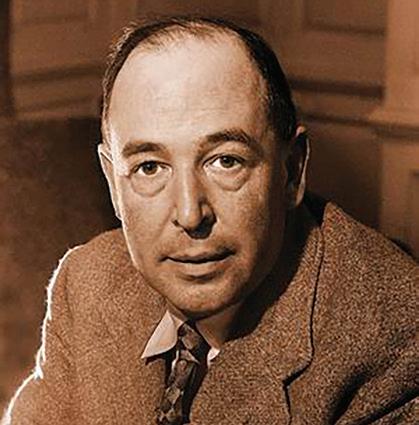
In one way we think a great deal too much of the atomic bomb. “How are we to live in an atomic age?” I am tempted to reply: “Why, as you would have lived in the sixteenth century when the plague visited London almost every year, or as you would have lived in a Viking age when raiders from Scandinavia might land and cut your throat any night; or indeed, as you are already living in an age of cancer, an age of syphilis, an age of paralysis, an age of air raids, an age of railway accidents, an age of motor accidents.”
In other words, do not let us begin by exaggerating the novelty of our situation. Believe me, dear sir or madam, you and all whom you love were already sentenced
to death before the atomic bomb was invented: and quite a high percentage of us were going to die in unpleasant ways. We had, indeed, one very great advantage over our ancestors—anesthetics; but we have that still. It is perfectly ridiculous to go about whimpering and drawing long faces because the scientists have added one more chance of painful and premature death to a world which already bristled with such chances and in which death itself was not a chance at all, but a certainty.
This is the first point to be made: and the first action to be taken is to pull ourselves together. If we are all going to be destroyed by an atomic bomb, let that bomb when it comes find us doing sensible and human things—praying, working, teaching, reading, listening to music, bathing the children, playing tennis, chatting to our friends over a pint and a game of darts—not huddled together like frightened sheep and thinking about bombs. They may break our bodies (a microbe can do that) but they need not dominate our minds.
– “On Living in an Atomic Age” (1948) in Present Concerns: Journalistic Essays
When the NBA cancelled its season, along with all other major sporting events, I admit my initial reaction was fear we were overreacting to the Coronavirus. The amount of both information and misinformation is challenging to sort through. Unless you’re a medical professional, you’re fairly unqualified to make definitive statements on the situation. Reading two Facebook posts does not an expert make.

TIBBETTS
The Southern Baptist Convention’s primary benefits provider will waive costs for physician-ordered diagnostic testing for coronavirus for participants in its health plans. GuideStone Financial Resources also has provided information related to current market volatility due to coronavirus.
“GuideStone is committed always to honoring the Lord by being a lifelong partner with our participants in enhancing their financial security,” said GuideStone President O.S. Hawkins. “As it relates to our health plans and other insurance coverage, we will be a trusted advocate for the churches, ministries, pastors, and staff we serve.”
But as the situation has developed, I am choosing as a pastor and Christian citizen to be submissive and obedient during this call for limiting social contact. Better to find solidarity with our society in a time of emergency than to appear dismissive and miss an opportunity to connect and care as Paul also commands in Titus 3:1.
“Remind [believers] to be submissive to rulers and authorities, to be obedient, to be ready for every good work.”
Paul’s first two commands tie together, literally calling churches to be ready to respond and responsive when the moment comes that rulers and authorities call for reasonable action. As I decided what we should do in our single-staff church, I got ready by discussing possibilities with deacons, ministry leaders, and fellow pastors. I concluded if we were asked by our government to cancel, we would, but if not, we would reduce our ministry footprint.
Kentucky’s governor earlier in the week had urged churches to close temporarily. Some churches saw this as a time of oppression in which they needed to stand for the gospel. One leader said their church would continue forward on Sunday, noting that when it comes to the people and their faith in Kentucky, “You do not mess with the church.” That felt like an unhelpful way to respond to a governor who seems genuinely concerned with stopping a sickness, not religious expression.
Now the Coronavirus has brought a level of fear that I’m hard-pressed to compare to any other time in my life. But this is an opportunity for Christians to operate from a place of faith over fear. As Isaiah 26:3 reminds us, “You keep him in perfect peace, whose mind is stayed on you, because he trusts in you.”
Let us as Christians be compassionate towards those who fear. Let us be the example of good citizenship. Let us invite others into the citizenship of heaven through Jesus Christ. In a time of sickness, let us speak to the greatest sickness of sin suffered by every human, and the great Savior Jesus who can heal without fail.
Heath Tibbetts is pastor of First Baptist Church of Machesney Park. Read the full column at IllinoisBaptist.org.

As Coronavirus shuttered most in-person gatherings indefinitely, church leaders mobilized quickly to keep their congregations on track and on mission to meet needs in their community. But how does ministry happen when even medium-sized gatherings are discouraged? Across Illinois, IBSA church leaders are communicating with their congregations about ways to respond to immediate needs.
Many churches are also working to keep community strong, even as groups aren’t meeting together physically. Leaders are sharing ideas for personal discipleship and spiritual growth, even when churches and small groups can’t meet in-person.
Red Hill Church in Edwardsville created a Google form to assess virusrelated needs and resources. The form, linked on the church’s Facebook page, asks if people have specific needs, including housing, household items, or meals, and also if people are willing to provide goods and services or housing. There’s also space to submit prayer requests and the names of people with needs the church can meet.
Facebook your meetings Pastors and small group leaders can provide Bible studies online through Facebook Live or other media options. Hold meetings at a preannounced, regular time so that as many as possible can join you. Communicate that Bible studies will be available after the fact on the social media platform.
Use online giving options Encourage people to continue to give to the church without having to be there physically. Many banks offer online payment. Givers can designate the church as a payee and have their offering submitted at a specified time.
Start a text message collective. Remind, a church communication system, offers a free service for leaders to stay in touch with members via text messages. Go to remind.com to learn more.
Develop homebound call lists. Church members can receive phone calls on a regular basis. Any needs they have can be shared and met through home delivery in accordance with health department guidelines.
Some churchgoers are using cancelations as an opportunity to hopscotch services across the country via streaming. Carole Doom, a member of the IBSA staff, posted March 15 that she virtually attended a service at her own church in Illinois, plus services streamed from Ohio and Florida.
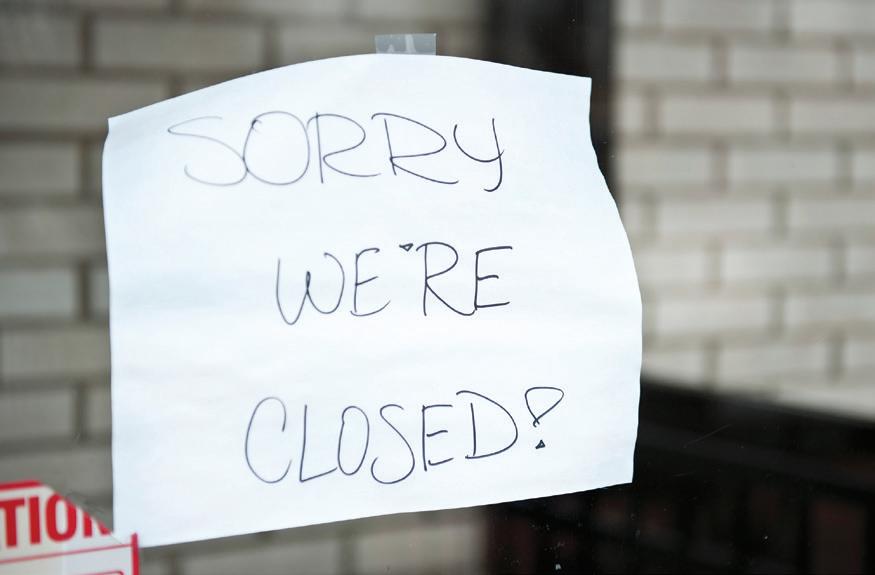
Others on Facebook chimed in about going to their own church online and attending church in another time zone. When one person lamented online that her church wouldn’t be holding an in-person or live streamed service, several others sent links inviting her to their church’s online services that Sunday.
Dorrisville Baptist Church in Harrisburg posted links to a community feeding program that will provide breakfast and lunch for kids in southern Illinois who usually receive those meals at school. Churchgoers were invited to sign up as meal deliverers.
Vale Church in Bloomington has created a way for care requests to be submitted online, said adult ministries pastor Nolan Recker. The requests haven’t started coming in yet, but the team is ready, Recker said. “We have tripled our Care Team Network team over the weekend and they are eager and waiting for opportunities to meet whatever needs arise.”
Collect food items For children who are out of school and in need, as well as for the homebound, designate a drop-off point outside the building or in an entryway. Many people will need help getting deliveries, if store shelves are empty and restaurants are mostly closed.

Move prayer meeting online. Balance Bible study with time to pray as well. Social media video platforms have the option for people to provide prayer requests.
Discuss their fears. Metro Community Church in Edwardsville posted a guide for parents to use with their children as they talk about Coronavirus fears.
Offer online Bible study guides for families. Ask children’s ministry leaders and student leaders to provide content for families in their care. LifeWay has developed a free resource to supplement Sunday school.
Encourage personal responsibility for leading Bible study. Utilize new services such as Right Now Media. Help your church family access Bible studies from home for all ages, anytime. Churches can link to these studies and also send out discussion guides to help families talk about what they’ve studied.
For more ideas visit IBSA.org/Church-helps
Fears over Coronavirus and its spread across the United States have already caused some churches to temporarily suspend services. As congregations mull preventive actions, some churches in parts of the world already affected by the virus are sharing how the unforeseen circumstances have been an opportunity to try new ministries or beef up existing outreaches.
Reach out. Jane*, a nurse in East Asia, lives in a city where fellowship and community were difficult as the virus spread, due to travel restrictions and suspended group gatherings. But Jane and her husband saw God open doors for them to love and serve their neighbors in small but meaningful ways. Just last week, when Jane was outside, she saw an elderly woman who lives close by and asked about her health.
“Honestly, since this has happened, when you go outside, a lot of people have not even wanted to look at you or interact. They’ve seen you as the enemy,” Jane said, speaking to the fear that people have had of catching the virus. “She was just so excited that I asked about her and checked in on her.”
Improve technology. In Singapore, churches are working to enhance streaming capabilities and video ministries, in the event they can’t meet in person. Pastor Daniel Khong told Christianity Today meeting online has strengthened his church, Faith Community Baptist.
“Many of our cell groups come together in homes to watch our service livestream,” Khong said. “We deliberately end our livestreamed services early so that our cell groups can go out and pray over their neighborhood. Many have said they now feel a sense of responsibility for the spiritual well-being of their community, and some were even able to share the gospel with people they met.”
Pray strategically. Also in Singapore, CT reports prayer movements have started to address concerns about COVID-19. Every day at noon, St. Andrews Cathedral rings it bells, signaling a moment of unified prayer across the island. The Assemblies of God of Singapore calls churches together for COVID-19:00, a prayer initiative that starts at 7 p.m. every evening.
“For such a time as this, unity is the key,” said LoveSingapore, the organization that facilitates the noon prayer gathering. “We believe in the power of prayer agreement. For such a time as this, we need every believer to arise and seek God together for Singapore.”
*Name changed.

Two bills that would have limited abortion in the U.S. were voted down by Senators in February, including a measure that would have prohibited doctors from performing an abortion after 20 weeks. The Pain-Capable Unborn Child Protection Act failed by a vote of 53 to 44, while another bill that would require medical care for babies who survive an abortion attempt failed 56-41.
“It ought to be a national scandal that the United States Senate failed to advance either of these basic and common-sense bills that would protect human life,” said Russell Moore, president of the Ethics and Religious Liberty Commission. “Our work to defend human dignity is a long-term effort, and we will continue forward with diligence and in prayer for the day that every life is valued.”
A Missouri Baptist pastor is facing accusations that he failed to cooperate with police during a 2005 sexual abuse investigation involving his church, calling into question his recent appointment as a trustee of Southwest Baptist University in Bolivar, Mo.
Mike Roy was appointed a trustee last year by the Nominating Committee of the Missouri Baptist Convention. The victims’ advocacy group For Such a Time as This said the convention and the university didn’t adequately vet Roy before appointing him, Baptist Press reported.
Chicago | Wheaton College students can continue to share the gospel in Chicago’s Millennium Park, after the city declined to appeal a judge’s ruling against rules that prohibit speeches and handing out literature in most of the park.
Judge John Robert Blakey granted the students a preliminary injunction Feb. 20 and set a status hearing for March 4, where the city revealed it wouldn’t appeal Blakey’s ruling.
“In doing so the City admits that certain aspects of the rules that were being enforced in Millennium Park were unconstitutional,” the Mauck & Baker law firm reported after the hearing. Mauck & Baker represented Wheaton College students who were prohibited from preaching in the park in December 2017. In April 2018, the city released new rules that divide Millennium Park into “rooms” and restrict speeches and handing out written communication to one corner of the 25-acre park.

Mauck & Baker said two sections of the rules will be removed or revised “so that they will no longer overly restrict free speech, the free exercise of religion, the distribution of
free literature, or the opportunity to collect signatures for petitions.”
Following Blakey’s Feb. 20 ruling in their favor, the Wheaton students returned to the park to share their faith there for the first time in more than a year.
“This is a win,” said attorney John Mauck, “not only for our evangelists who want to share the message of new life through Jesus, but also for people of all religions and political persuasions who want to share their message with the 20,000,000 annual visitors to Millennium Park.”
Ron Hale will assist Executive Committee

Nashville, Tenn. | One-time IBSA evangelism director Ron Hale is one of seven members of a task force that will study the past and present activities of the Ethics and Religious Liberty Commission (ERLC).
New research shows that not only are evangelical colleges emphasizing world religions, but also that the students who are making the biggest gains in knowledge are sticking close to the faith they brought with them.
Data from the Interfaith Diversity Experiences and Attitudes Longitudinal Survey shows Christian colleges “are able to expand the religious worldviews of their students while also grounding them in the evangelical faith tradition,” Ryan Burge wrote at ChristianityToday.com.

“As the world becomes increasingly diverse and interconnected, this could be a major selling feature of evangelical higher education.”
– Baptist Press,Christianity Today
Hale, now a retired pastor in Jackson, Tenn., was named Feb. 27 by Mike Stone, chairman of the Southern Baptist Convention Executive Committee (EC), who also will serve on the task force. The EC approved the task force during their February meeting, citing concerns about how the ERLC’s actions are affecting the SBC and its relationships with churches, associations, and state conventions.
Joining Stone and Hale on the task force are:
- Mike Lawson, senior pastor, First Baptist Church of Sherman, Texas
- Cheryl Samples, retired, Dallas, Ga.
- Hoyt Savage, lead pastor, Foothills Baptist Church, Las Vegas
- Monte Shinkle, senior pastor, Concord Baptist Church, Jefferson City, Mo.
- Rolland Slade, senior pastor, Meridian Baptist Church, El Cajon, Calif.
The task force has been the subject of an online exchange of words between officers of the EC and ERLC. In response to the task force announcement, David Prince, chairman of the ERLC Board of Trustees, and the ERLC trustee officers responded in an open letter to Stone and EC members, calling the task force “unwarranted, divisive, and disrespectful.”
Stone and the EC officers responded:
“When we continue to hear a growing number of reports that churches are either planning to decrease or withhold Cooperative Program gifts and are given specific reasons that relate to a Southern Baptist entity, we have a responsibility that we are granted under the bylaws of the SBC to consider those reports.”
The task force’s work is expected to begin immediately. The motion passed by the EC calls for a report from the group at or before the Sept. 21-22 EC meeting in Nashville.
– From Baptist Press
DISTANCELEARNING–NewOrleansSeminary studentsprayoverrefugeeshousedinabandoned buildingsduringamissiontriptoAthens,Greece.


Opening doors forthe Gospel Cooperative Program
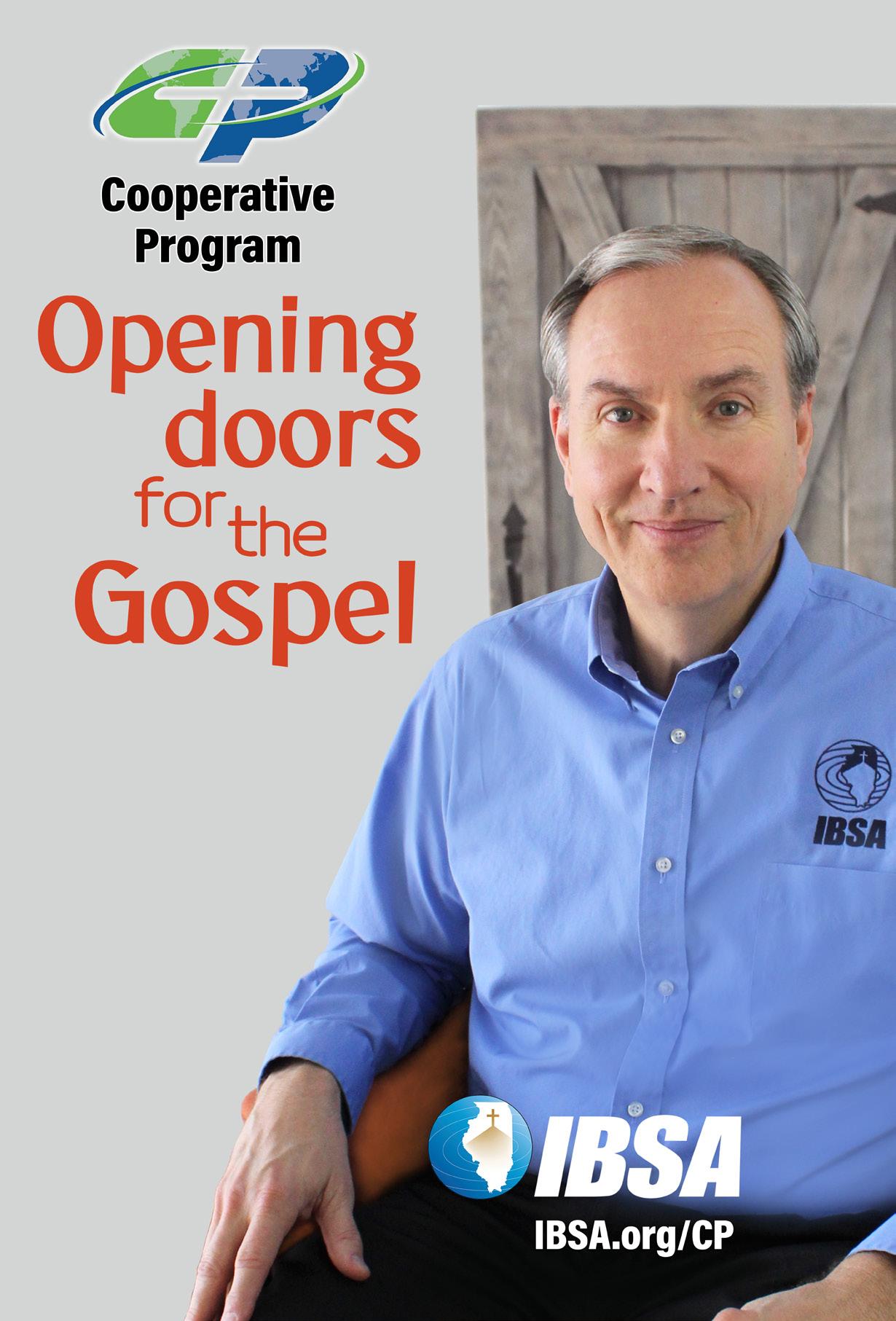
mater,SouthernSeminaryinLouisville, Kentucky. “Over16,000students
SouthernBaptistseminariesarebeing equippedtobecomepastors,trainers missionaries,andleaders,sothatmany moremayhearthegospelaroundthe world.”ThroughCP,tuitioniscutinhalffor seminarystudentswhoaremembers
ofSouthernBaptistchurches.“Being abletotellstudentsthatonthephone,” Jonessaid,“theywerealwayssoexcited,andnormallyshocked.“Theydidn’tknowaboutallthegreat benefitsoftheCooperativeProgram, andsoitwasmygreatjoytotellthem aboutthat.Anditreallyhaseasedthe burdenforsomanystudentsthatwant tobeequippedsothattheycanshare thegospelwithmanymore.” CPbenefitsboththegiverandthe recipient,Jonessaid:theaverage churchgoer,whooftendoesn’trealize howtheirgiftscanmakeadifference, andtheseminarystudent,workingand trainingtofulfillthecallofGodontheir lives.Forboth,CPopensdoorstothe gospel.
SeeCarrieJones’sstoryat IBSA.org/CP
Association


My family, church, and I am forever grateful for those that have given so I could have access to theological training as a biblical counselor! The theological training I received at Southern Seminarywas incredibly rich with truth and practicalwisdom for everyday living as a Christ follower, husband, daddy, and pastor. –TimDrury,MasterofDivinity‘19, andstaffmemberatFBC,Bethalto of national CP gifts aid theological education


Southeastern (WakeForest,NC) Southern (Louisville,KY) Midwestern (KansasCity,MO)


Gateway (Ontario,CA) Southwestern (Ft.Worth,TX) New Orleans (NewOrleans,LA)
The Cooperative Program (CP) is Southern Baptists’ unified method of supporting missions and ministry locally, and around the world. It is the way Baptists give more than $196 million annually to send missionaries, respond to urgent physical needs, and plant new churches to reach people who don’t yet know Christ. In Illinois, Baptists give more than $6 million through CP annually.

andtheirextensioncentersacrossthecountry.
Mission Illinois isafreeSundaybulletininsertreportinghowIllinoisBaptist churchesreachtheworldthroughCooperativeProgramgivingtomissions. CalltheIllinoisBaptistStateAssociationat(217)391-3119or e-mail MissionIllinois@IBSA.orgforafreesubscriptionforyourchurch.


Bulletin inserts are available free for your church. Go to IBSA.org/CP to download bulletin inserts and view videos in the “Opening Doors” series.
Our CP promotion team has often commented on the challenges of promoting the Cooperative Program, particularly among newer and younger Southern Baptists. “CP needs a face!” we’ve said, celebrating the lasting influence of Lottie Moon and Annie Armstrong, while wishing for a similar champion for nearly century-old CP.
Here’s the thing: We are CP’s champions. Southern Baptists believe in unified, cooperative giving. The heart of IBSA’s “Opening Doors” campaign is to put a face (four faces, in fact) with CP.
On April 26, Baptist churches around the country will celebrate CP Sunday. As your church weighs how to share the story of CP, consider IBSA’s “Opening Doors” series of videos and bulletin inserts.


Mike Young is a former International Mission Board missionary who now helps others prepare for ministry and missions. At Streator Baptist Camp, he helps provide a respite from everyday life and a place where people can connect with God.

Carrie Jones grew up in a Baptist home. She thought she understood and appreciated the Cooperative Program. But it was her time as a seminary student that really drove home the value of Baptists working together to fund theological education for the next generation of leaders.


John Yi came to faith in Christ at a Southern Baptist church plant. Now, through the support of the Cooperative Program, he works with church planters in Chicagoland to reach more people with the gospel.
Nate Adams’s great-grandmother, Effie Hooks, is part of a legacy of giving that encourages Adams as he encourages IBSA churches to join in cooperative missions giving. “I support the Cooperative Program,” Adams says, “because I believe without a doubt it is the most efficient and effective means for spreading the gospel, starting right here in Illinois when I give my offering to my local church.”
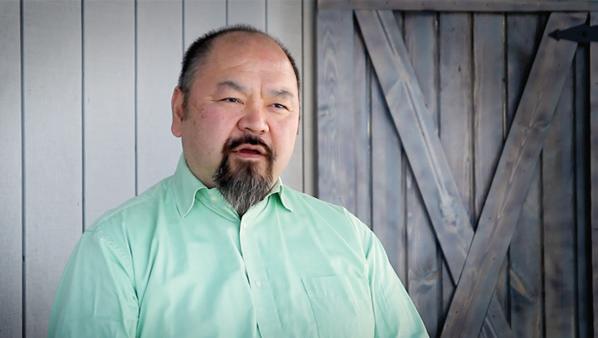
Board members partner with IBSA staff to aid churches in Illinois
Springfield | The team responsible for shaping IBSA strategy and policy works mostly behind the scenes. The IBSA Board of Directors, made up of 32 church and lay leaders, helps set the Association’s immediate priorities and long-term goals, working with Executive Director Nate Adams and the IBSA staff. They also help maintain and improve IBSA’s existing resources to make them effective and beneficial for Illinois Baptist churches.
The full Board meets every March and September in Springfield to work through an agenda dedicated to making sure IBSA’s partnership with churches in Illinois remains strong and effective.
The Board functions as IBSA’s governing body between the Association’s Annual Meetings, where churches send messengers to vote on policy, strategy, and resolutions that voice IBSA’s position on specific issues. Between those meetings, the IBSA Board acts as a link between Illinois churches and IBSA.
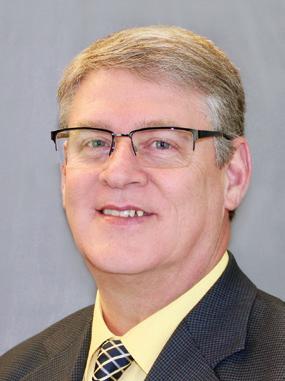
In addition to twice-annual meetings as a full Board, members also meet in three committees (see current assignments on page 9):
The Administrative Committee reviews Board policy and recommends adjustments to ensure efficient operations of the Board and IBSA,
Josh Bledsoe Monticello, Calvary 806 Adams Ct Monticello, IL 61856 (618) 780-7101 (Cell) (217) 762-2988 (B) pastorjosh@monticellocalvarybaptist.net
2019 - 2021 Resource Development
Jeanette Cloyd Fairfield, North Side 800 NE 4th Street Fairfield, IL 62837 (618) 599-5189 (Cell) jeanettecloyd@yahoo.com
2015 - 2022 Strategic Planning
Bob Dyer Bourbonnais, Bethel 211 Tiverton Road Kankakee, IL 60901 (815) 937-4977 (815) 545-6980 (Cell) rdyer211@comcast.net

2019 - 2021 Administrative Chair
Sherrie Harlow Carterville, First 117 Jeremy Drive Carterville, IL 62918 (618) 889-4808 (618) 457-6200 Ext. 6791 sherrie.harlow@sih.net

2017 - 2020 Administrative
so that the various segments of IBSA can effectively work together to achieve its mission, vision, and goals. The committee also serves as a personnel committee for the Board’s one employee, the IBSA Executive Director.
The Strategic Planning Committee works with the Executive Director to assist the Board in assessing the needs of churches and associations, and the effectiveness of IBSA’s delivery of services to meet those needs. The committee annually reevaluates IBSA’s mission and vision statements, and works with the Executive Director to design the Association’s yearly goals.
The Resource Development Committee assists in budget development, allocation of Cooperative Program resources, long-range financial planning, and facility management. The committee also recommends to the Board the percentage of Cooperative Program receipts to be sent to the Executive Committee of the Southern Baptist Convention.
In addition to the IBSA Board of Directors, other Illinois Baptists lead the Association through offices elected at the IBSA Annual Meeting (see
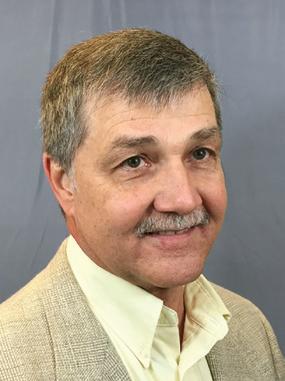
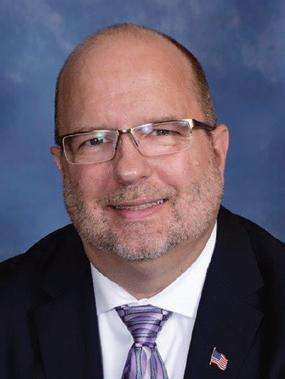
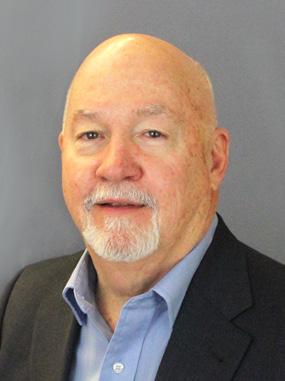


Alma Bonner Chicago, Faith Tabernacle 3512 W 85th Place Chicago, IL 60652 (773) 776-7262 (H) (773) 412-2936 (Cell) poodah1001@comcast.net
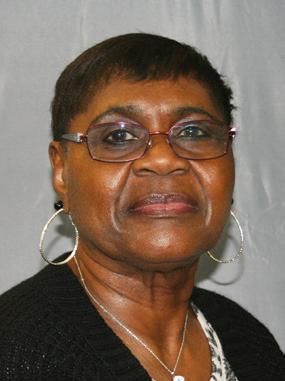
2015 - 2021 Administrative
Andy DeWitt Salem, First 205 Woodland Dr Salem, IL 62881 (618) 267-0213 (Cell) (618) 548-4060 (B) j.dewitt05@yahoo.com


2019 - 2021 Administrative Board Vice Chair
Terry Foster Metropolis, First 4455 Orchard Rd Metropolis, IL 62960 (618) 638-7561 Judge_tjf@yaoo.com
2019 - 2022 Administrative
Luke Henry Savoy, Cornerstone 312 Deerpath St Tolono, IL 61880 (618) 558-3312
Luke.henry@cornerstonesavoy.org
2019 - 2022 Strategic Planning
current officers on page 12), and on six standing committees:
• Committee on Committees, charged with nominating Illinois Baptists to serve on the standing committees
• Committee on Order of Business, which assists in planning and evaluation of the IBSA Annual Meeting
• Credentials Committee, the group that reviews applications of churches affiliating with IBSA
• Historical Committee, tasked with preserving and promoting the history and legacy of Illinois Baptist churches
• Nominating Committee, which fills open positions on three IBSA entity boards: Illinois Baptist State Association, Baptist Children’s Home and Family Services, and Baptist Foundation of Illinois
• Resolutions and Christian Life Committee, charged with developing and presenting resolutions to be voted on by messengers at the IBSA Annual Meeting
For more information about the Board or IBSA’s standing committees, contact IBSA at (217) 319-3107.
Cal Callison East Peoria, Richland Southern 216 S. Hawthorne Ave. E. Peoria 61611 (515) 468-5891 (Cell) calcallison@gmail.com
2017 - 2022 Resource Development
Bob Dickerson Marion, First 210 W. Boulevard Marion, IL 62959 (618) 922-2767 (Cell) (618) 997-9386 (B) pastor@fbmarion.org
2017 - 2022 Strategic Planning Board Chair
Mark Goldman Herrin, First 205 E. Hamilton St Energy, IL 62933 (618) 367-2450 markrgoldman@yahoo.com
2019 - 2020 Strategic Planning
Gerald Higdon Orion First 8 Red Oak Drive Coal Valley, IL 61240 (309) 373-3559 (Cell) (309) 799-3060 higdon_family@yahoo.com
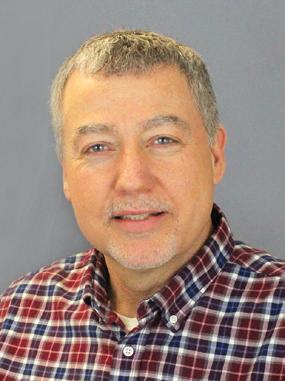
2017 - 2020 Administrative
Drake Caudill Carmi, First 274 Medlin La Carmi, IL 62821 (502) 939-3814 pastordcaudill@gmail.com




2019-2022 Administrative
Danny Donato Nashville, Lighthouse 981 S. Heaman Nashville, IL 62263 (270) 217-8528 (Cell) (618) 327-4006 (B) danny@lcc-nashville.com
2015 - 2021 Strategic Planning
Don Hannel Pleasant Hill, First 304 East Bay St Pleasant Hill, IL 62366 (217) 430-0951 Dhannel64@gmail.com
2019 – 2022 Resource Development
Mike Jameson Granite City, Pontoon 134 Catalpa Granite City, IL 62040 (618) 931-2530 (H) (618) 210-7885 (Cell) mlj2glj@aol.com
2016 - 2022
Administrative Board Secretary
Sammy Simmons Benton, Immanuel 905 S. Main St Benton, IL 62812 (618) 663-5802 sammy@ibcbenton.com
2019 - 2020 President
Sharon Carty Carlinville, Emmanuel 344 Loomis Lane Carlinville, IL 62626 (217) 341-2416 (Cell) skcarty72@gmail.com
2019 - 2020 Recording Secretary
Bob Dickerson, Chair


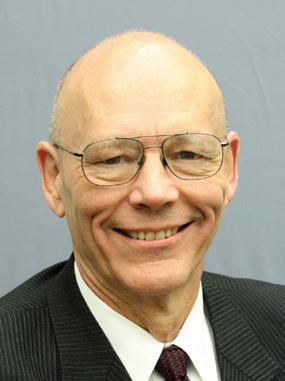
Andy Dewitt, Vice Chair

Mike Jameson, Secretary
Additional IBSA committees
Committee on Committees
Committee on Order of Business
Credentials Committee
Historical Committee
Nominating Committee
Resolutions and Christian Life Committee
Brent Joy Pittsfield, Calvary 355 Lowry St Pittsfield, IL 62363 (217) 730-4616 pastor@calvarypittsfield.com
2019-2020 Resource Development
John Mancha Midlothian, Higher Ground 113 S. Griffin St Grant Park, IL 60940 (708) 465-4395 Jmancha1969@aol.com
2019 - 2022 Resource Development
Amy Rogers Robinson, Highland Avenue 12782 E. 1900th Ave Hutsonville, IL 62433 (618) 563-1080 (309) 241-0304 (Cell) amy.d.rogers66@gmail.com
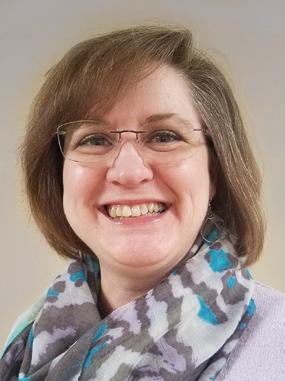
2019 - 2020
Resource Development
Kathy Stanford
Pekin, Liberty PO Box 39 Green Valley, IL 61534 (309) 352-2109 (309) 360-1480 (Cell) KStanford@grics.net
2019 - 2021 Administrative
Heath Tibbetts Machesney Park, First 8015 Ravere St Machesney Park, IL 61115 (815) 508-3300 pastor@fbcmp.net
2019 - 2020 Vice-President
Brianna Trowbridge Albion, Samaria Missionary 1188 Massilon Rd Albion, IL 62806 (618) 554-5330 Trowbridge0605@gmail.com
2019 - 2020 Assistant Recording Secretary
Administrative
Alma Bonner, Secretary
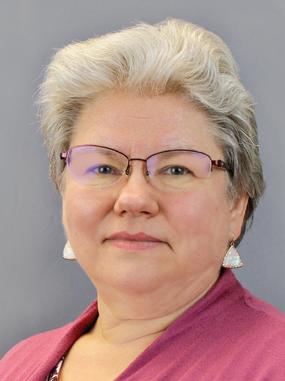

Drake Caudill
Andy DeWitt
Bob Dyer, Chair
Terry Foster
Sherrie Harlow, Vice Chair



Gerald Higdon
Mike Jameson
LaRue Parr
Kent Renshaw
Kathy Stanford
Barbara Lee O’Fallon, First 507 Westfield Drive O’Fallon, IL 62269 (618) 622-0664 (618) 520-5073 (Cell) barbara.lee@fbcofallon.org
2019 - 2021 Resource Development
LaRue Parr Anna, Big Creek 2645 Big Creek Church Rd. Dongola, IL 62926 (618) 697-0286 (Cell) larue.parr14@gmail.com
2019 - 2021 Administrative
Jacqueline Scott Harrisburg, Dorrisville 105 Southwest Drive Harrisburg, IL 62946 (618) 294-2392 (Cell) (618) 252-1764 (B) preacherladyj57@yahoo.com
2015 - 2021
Strategic Planning
Darryl Williams Anna, Anna Heights 310 Davie Street Anna, IL 62906
(618) 697-5597 (Cell)
(618) 933-5916 (B) darryl@williamsfamily.me
2017 - 2022 Resource Development
Resource Development
Josh Bledsoe
Cal Callison, Vice Chair
Don Hannel
Brent Joy
Barbara Lee, Secretary
Curt Lipe, Chair
John Mancha
Amy Rogers
Darryl Williams
Rob Windes
Strategic Planning
Jeanette Cloyd
Bob Dickerson
Danny Donato, Vice Chair


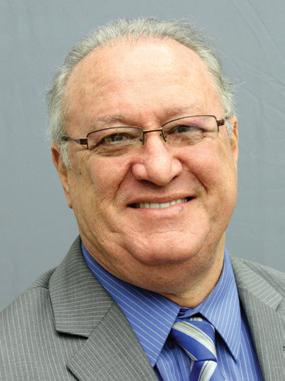

Mark Goldman
Luke Henry
Jeffery Logsdon, Secretary

Tim Rhodus
Jacqueline Scott
Jay Simala, Chair
William Simmons
Matthew Woodford
Curt Lipe Galesburg, Faith 3288 Lakeside Court Galesburg, IL 61401 (309) 335-6760 (H) (309) 344-1371 Ext. 11371 (B) curt.lipe@osfhealthcare.org
2015 - 2020 Resource Development Chair
Kent Renshaw Mt. Vernon, Logan Street 3405 Piccadilly Ave. Mt. Vernon, IL 62864 (618) 315-9021 (Cell) (618) 244-2889 (B) attorney@mvn.net
2015 - 2020 Administrative
Jay Simala Zion, New Song 7146 Brae Court Gurney, IL 60031 (847) 804-1058 (Cell) jsimala@tiu.edu
2015 - 2021 Strategic Planning Chair
Robert Windes Allendale, Freedom PO Box 93 Allendale, IL 62410 (812) 215-9724 (Cell) (618) 299-5241 robwindes@mac.com
2017 - 2022 Resource Development
Jeffrey Logsdon Wilmington, Island City 770 Kerry Street Wilmington, IL 60481 (816) 686-5957 (Cell) (815) 476-9750 (B) jlogsdon2462@gmail.com
2017 - 2020 Strategic Planning
Tim Rhodus Carlinville, Cross 1030 West Main Street Carlinville, IL 62626 (217) 415-3366 (Cell) (217) 854-2837 (B) tim@thecrossmatters.org



2017 - 2021 Strategic Planning
William Simmons Bethalto, First 1 Oak Crest Drive Bethalto, IL 62010 (314) 560-4603 (Cell) (618) 377-5863 billsimmonsretired@gmail.com
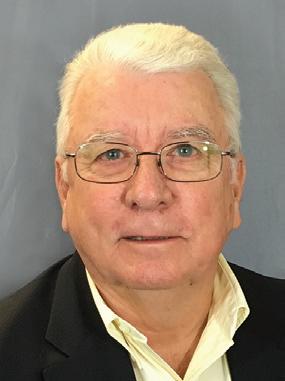
2017 - 2020 Strategic Planning
Matthew Woodford Plainfield, Springbrook Community 524 Litchfield Way Oswego, IL 60543

(630) 946-9369 (Cell) (630) 355-9590 Ext. 14 (B) matt@springbrookchurch.org
2017 - 2020 Strategic Planning
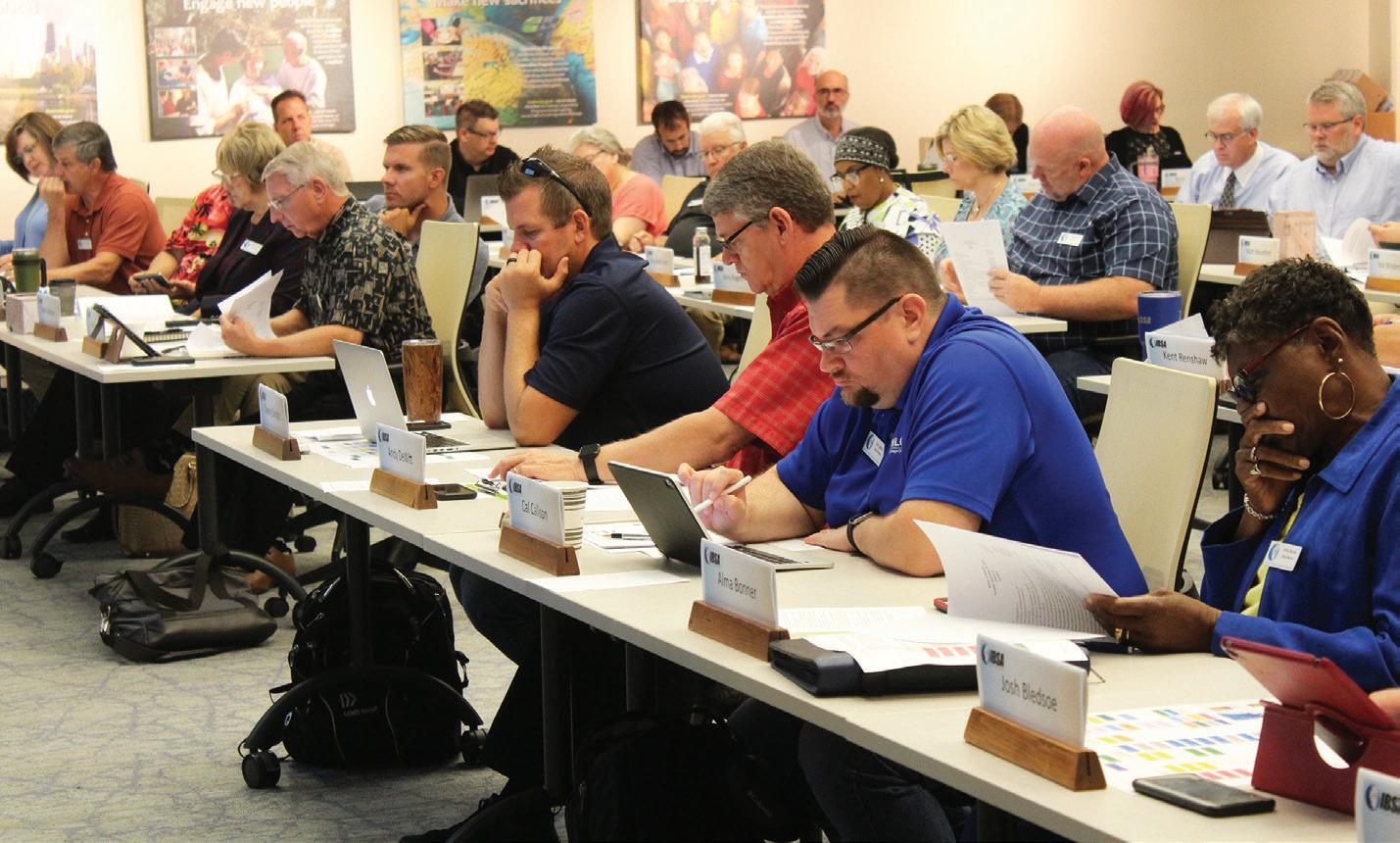


Cookeville, Tenn. | For the first time in his life, Darrin Crockett is glad God did not answer his prayer.
On Monday night, March 2, Crockett and his family went to bed as usual. Their dog Doc, however, barked incessantly throughout the night. Crockett remembers asking God “to make that dog quit barking.”
God apparently chose not to answer that prayer. As a result, the Crockett family is alive and well after an estimated EF-4 tornado blasted through their home in Cookeville, Tenn., leaving them trapped under a pile of rubble. The tornado killed 25 in the Nashville area.

Reflecting on that night, Crockett sees how God orchestrated their survival. Had Doc not barked most of the night, Crockett may not have heard his phone alarm signaling a storm warning. As a result of the warning, he, his wife, Jenny, and daughters Carly, Camryn, and Carrigan took
refuge in the laundry room, the only place they probably could have survived, Crockett said.
“We heard it coming and suddenly the house began to shake,” he said. “Next thing I remember is I felt grass underneath me. The tornado must have picked up the entire house, dropped it in the yard with us buried underneath it.”
what few openings there were, and the family crawled out from the collapsed building with only a few minor cuts and scratches.
Crockett, associate pastor of VineBranch Community Church and a school administrator and athletic director at Highland Rim Academy, both in Cookeville, acknowledged that their survival is a miracle.

“It is amazing,” he said. “If our dog had not alerted us, who knows where we would have ended up?”
As he stood near the pile of rubble that once was his house and watched volunteers salvage items and drag the ruins to nearby trash piles, Crockett knew without a doubt that God spared him and his family.
of support from the community. “It’s amazing to look around and realize we are not alone,” he said.
Crockett knows he and his family are recipients of God’s grace. “I’ve seen God’s grace in so many ways and in so many places. This affirms it even more,” he acknowledged.
The outpouring of support from Baptists and other Christians, not only in the community, but from across the state also has been “overwhelming and amazing,” he said.
Baptists have received a lot of negative press across the nation in recent months, Crockett observed. “But when it comes down to it, the church does what God calls it to do. Nothing else matters in times like these.”


The minister expressed his appreciation to Tennessee Baptists for their response, love, and resources. “It’s overwhelming.”
A two-by-four that fell across an overturned washer and dryer likely provided enough room to keep them from being crushed. When the storm passed, lightning flashes exposed
“We have tremendous peace and joy,” he said.
Two things, however, cause him to get emotional—knowing how close they came to someone planning their funerals this week and the outpouring
Though they have each other, the Crocketts did experience a significant loss in the aftermath of the tornado. Their beloved dog Doc, who probably saved their lives with his barking, did not survive.
“He will go down as a hero,” Crockett said. “We will celebrate him and talk about him for a long time.”
Before we take up the cross, we should consider the cost.
BYRounding the bend where I-57 meets I-70 at Effingham, there rises on the east side of the highway the largest cross you may ever have seen. In fact, it’s the largest cross in the United States. Bud Althoff wanted it to be so.
The Effingham resident had seen a similar cross while passing through Groom, Texas, on vacation and wanted one in Illinois—a bigger one. It’s two feet taller at 198 feet, but under the 200-foot limit which would have required a red light on top to alert airplanes. Starting in 1998, Althoff secured acreage adjacent to the Interstate, created the Cross Foundation, and gave millions to build the massive monument (pictured above).
The Cross at the Crossroads is not without controversy. The usual cadre of atheists and First Amendment protestors have objected to the cross and to its depiction on artworks about Effingham. As recently as January 2020, a group threatened suit against the city because of the cross’s inclusion on a public mural of local sites. But the cross has popular support.
“Everybody knows about the cross,” county resident Clara Brown told a central Illinois television station. “You always know you’re at Effingham because there’s the big cross sitting out there....When you
sit in the stadium and look at a football game, you see the cross anyway, and it’s just a natural part of the Effingham landscape.”
Bud Althoff died in 2016 at age 97, but the cross remains, just as he had hoped: a witness to the 20 million people who drive by it annually. The cross was erected just three months before the 2001 terrorist attacks. Since then, it has served as comfort in crisis. As a nearby billboard says, “In these trying times, a sign—God is in control.”
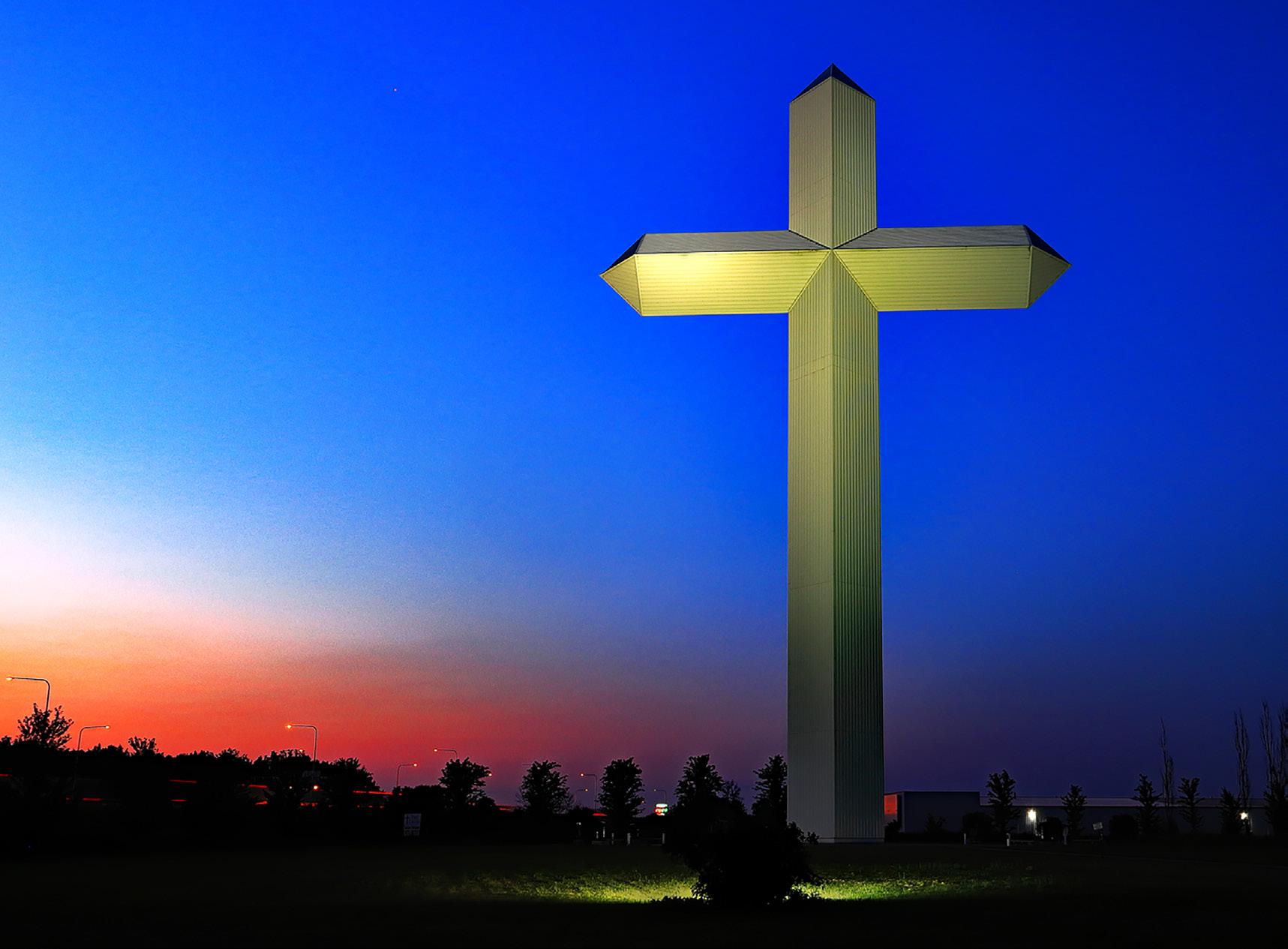
When Jesus told his disciples that they would have to take up their cross daily if they wanted to follow him, the admonition must have sounded strange to them. None of them were criminals convicted of capital offenses. None of them would have considered himself worthy of execution. None of them had a clue their beloved rabbi was himself headed to such an ignominious death on a cross. And to be associated every day with that instrument of debasement would not only have been inconceivable, but offensive.
“What could Jesus mean by that?” they would have asked (as they often did). And in our time, the question echoes. Jesus wants me to “take up my cross,” but what does that mean, and how can I do it? Wouldn’t
ERIC REED
“If anyone wants to follow after me, let him deny himself, take up his cross daily, and follow me. For whoever wants to save his life will lose it, but whoever loses his life because of me will save it.”
– Jesus (Luke 9:23-24)
‘Take up thy cross and follow Me,’ I heard my Master say; ‘I gave My life to ransom thee, surrender your all today.’ He drew me closer to His side, I sought His will to know; and in that will I now abide, wherever He leads I’ll go. It may be through the shadows dim or o’er the stormy sea; I take my cross and follow Him, wherever He leadeth me. My heart, my life, my all I bring to Christ who loves me so; He is my Master, Lord, and King, wherever He leads I’ll go
Continued from P. 11
it be easier to erect a giant monument and let people debate it?
Easier, perhaps, but effective? How much greater is the witness of millions—each carrying his own cross to a world that desperately needs its message.
Carbondale pastor Phil Nelson took the call literally a few years ago. He journeyed to Chicago and walked across much of the city carrying a seven-foot cross. Nelson had a burden for the city, particularly as a southern Illinoisan reaching out to needful Chicago. People were open to him. The conversations were frequent and gospel-focused, as his intent was made obvious by the big wooden cross propped on his shoulder. There was no doubting what Pastor Phil was all about—he was there to talk about Jesus.
But for everyday Christians, our outgoing message may not be so evident—unless we do what Jesus said. And even more important, do what Jesus did.
“Adopt the same attitude as that of Christ Jesus,” Paul urges in Philippians 2,
“who, existing in the form of God, did not consider equality with God as something to be exploited. Instead he emptied himself by assuming the form of a servant, taking on the likeness of humanity. And when he had come as a man, he humbled himself by becoming obedient to the point of death— even to death on a cross.”
To take up your cross means first to assume a lifestyle of humility. Identifying with the cross requires that we intentionally adopt the stance of the lowly in our society. From ministry among sinners and publicans, Jesus took further steps downward and let himself be marked by the device that defined the vilest criminals.
And he did so willingly. The God-Man did not clutch at his rights to throne and exaltation and worship. He got down in the mire with his own creation, we who are made from dirt. He subjected himself to this degradation that we might be saved from our own degradation. That is what the cross on a gold chain means. Its wearer is descending to the lowest place to help the lowest people.
To take up the cross means to embrace the symbolism of sacrifice. Jesus was about his father’s business and his holy mission at all conceivable cost to himself. How many of his followers can honestly say we have surrendered everything in order to become a sacrifice for the sake of others? Yet, that’s what the cross represents.
“When Christ calls a man, he bids him come and die,” theologian and martyr Dietrich Bonhoeffer said, describing not the end of the cross-defined life, but its beginning. To choose to follow Christ is the choice to lay down everything else. But our age is not one of self-denial. Quite the opposite, we live in the era of self and our culture worships at the temple etched overhead with its own name.
Following Jesus instantly puts us at odds with the values of our time. We may not dress like Old Order Amish or segregate ourselves like Hassidic Jews, but faithful followers of Christ will be just as out of step with the world as the more obviously religious. Carrying the cross has that effect.
Without the cross, there is no hope for lost humanity. As cross bearers, our message is the clarion call to salvation in Jesus Christ. It is not our own message. It brings us no followers. It brings us no personal glory. Choosing to shoulder the cross means bringing the gospel message for the remainder of our lives, at the cost of personal achievement, applause, or pleasure. Taking up the cross changes what we are about—day in and day out—both at the core of our being and at the extent of our reach.
That’s what “daily” implies.
We are not allowed to take up the cross one day and prop it in the corner the next, when humility, sacrifice, witness, and surrender seem too much to ask. Every day, every morning, the call remains. If you want to follow Jesus, that’s the requirement.
Take up your cross. Do it again. Do it today.
And do it wherever it leads.
Jesus’ cross led him down the Via Dolorosa, the way of suffering, to the killing ground outside of town. The GPS of his cross is set to Calvary, and Calvary is the place of death. The disciples did not know that when Jesus issued the call to follow him as carriers of the cross. It would be made plain in great spatters of blood on a dark Friday just before Passover when Jesus became the lamb of sacrifice John the Baptist had declared him to be three years earlier. And for his circle of followers, identifying with the cross of Christ would result in their own deaths—for all but one, martyrdom after years as itinerant missionaries, preachers, church planters, and founders of the Christian faith.
Songwriter B. B. McKinney was at dinner with a missionary friend of his in 1936. At the time, McKinney was the leader of the music department for the Alabama Baptist convention. He was leading the worship sessions at a statewide meeting, and his friend was the speaker.
The missionary had learned that he would not be returning to Brazil where he had served because of health problems. As he told the story at the table, McKinney asked about his plans. “I don’t know,” the missionary said, “but wherever he leads, I’ll go.”
By the time of the evening session, McKinney had turned this simple declaration into a song. McKinney linked these twin concepts of taking up the cross and following the Lord’s leadership, just as Jesus had said. That night he led the congregation in all four verses with music and a chorus:
Wherever He leads, I’ll go;
Wherever He leads, I’ll go;
I’ll follow my Christ who loves me so;
Wherever He leads, I’ll go.
“
We are not allowed to take up the cross one day and prop it in the corner the next, when humility, sacrif ice, witness, and surrender seem too much to ask.
– B.B. McKinney

On a recent Thursday night, leaders from across Illinois logged on and tuned into an online workshop on baptism. Webinar viewers watched on their screens as the baptistry of an IBSA church became a virtual classroom. Pastors and church leaders were invited to watch the step-by-step process, ask questions, and think through their own experiences with baptism.
The online session, part of a new Pastors Plus webinar series, is one way IBSA is engaging and developing leaders.
Online learning isn’t new, but it’s a method our team is using more and more. We’ve found webinars to be a great fit for leaders who are dispersed far and wide geographically, and who have busy schedules that make it difficult to get out of town for a meeting or conference.
Webinars give participants a way to engage with experts they would likely never meet in person. Viewers are face-to-face with high-quality teachers and trainers. If they’re watching in real time, participants have the opportunity to ask questions and get the answers right away.
I’ve seen webinars work well for busy leaders because there’s very little required of you as a participant. You don’t even have to be there on time—every episode is available to view after it’s recorded. Webinars allow us to speak to specific audiences about specific topics. Instead of talking about the abstract concept of leadership, for example, we can train leaders on specific competencies and skills.
Webinars also give us the opportunity to hear from experts who might not be available to travel to Illinois, but will gladly log on for an hour and share their wisdom on a specific topic.
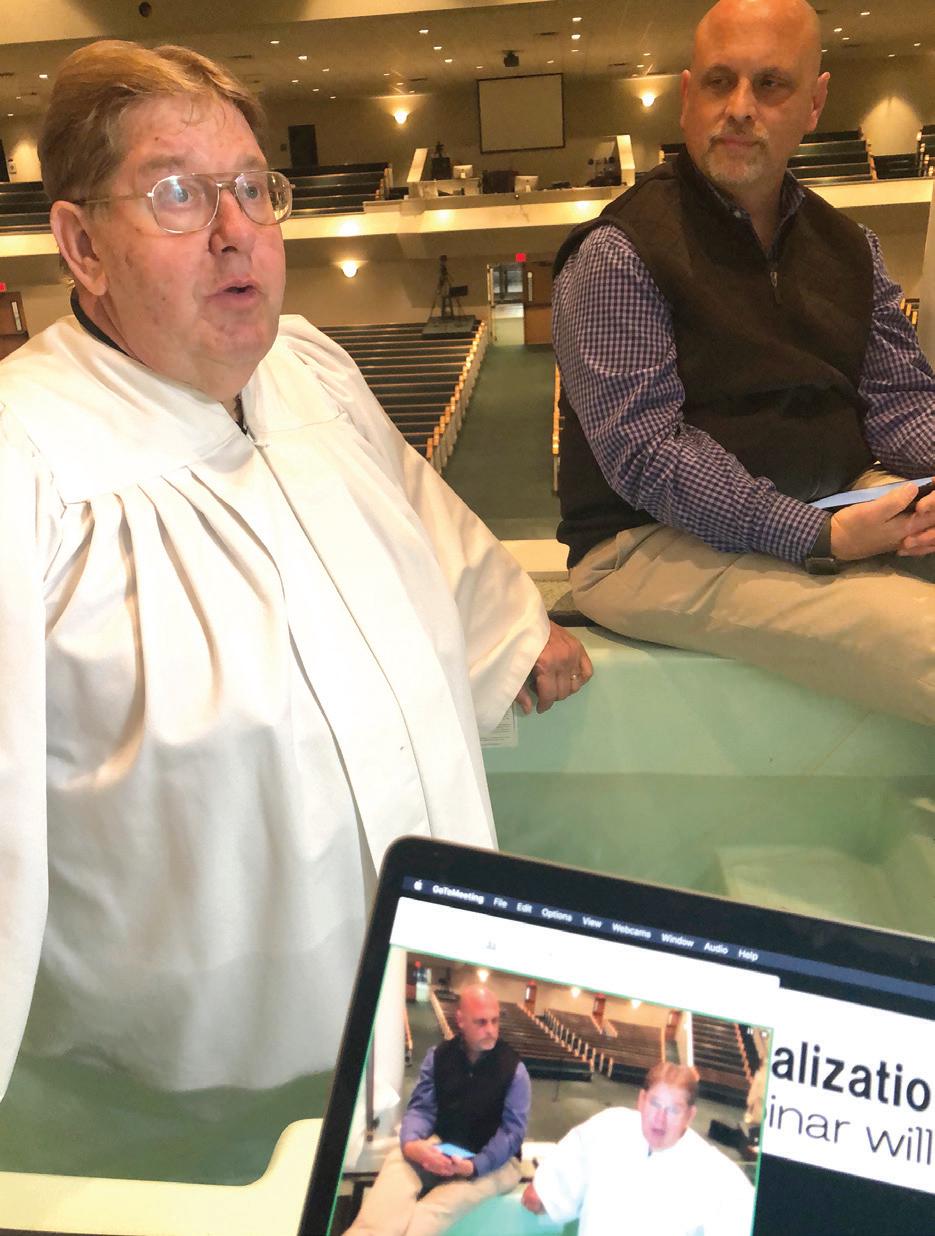
IBSA’s Leadership Development Team has recently launched two webinars to help pastors and ministry teams grow in specific areas. In addition to those series, the Revitalization Team has cre-
And other questions about homosexuality, the Bible, and same-sex attraction
Sam Allberry
We regularly have people who identify as LGBTQ attending our worship services. We constantly work to point them to the gospel. We absolutely refuse to endorse anything less than God’s design for their lives. This is the best resource I have read for this ministry.
ated a webinar for pastors at various stages of the church revitalization process.
Would you consider joining a webinar this year? Go to IBSA.org/leadershipdevelopment for more information about each current series, to view past sessions, and to sign up for the next one.

Designed as a practical guide for pastors, Pastor Plus is a monthly webinar series on individual functions of the church leader, like baptism, communion, and officiating a funeral. IBSA’s Jack Lucas facilitates each session, which offers on-the-job training for new pastors, or a refresher for any leader in need of it.
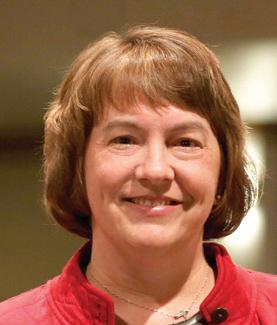

We believe that leadership development is discipleship. This series equips leaders in all areas of influence—their relationships, the marketplace, and the local church. The monthly webinars are for pastors, staff, small group leaders, marketplace missionaries, and any and all future leaders. Upcoming topics include leading and managing change, emotional intelligence, and dealing with toxic people.
Led by IBSA’s Scott Foshie and special guest Rob Peters of Corpus Vitae, this 8-session webinar series helps pastors assess themselves and their congregation as they prepare to lead through change in the church. Topics include re-envisioning pastoral leadership, casting a compelling vision, and creating a culture for change.
Ken Braddy
Designed as a guide for training teachers, this book explains 12 ways a church can enhance and grow its Sunday school. Braddy offers both concrete data and personal anecdotes that make his book readable and relevant for training.
C.S. Lewis
Mere Christianity resulted from a series of radio lectures Lewis was asked to give to help people make sense of the devastation of World War II. The reader comes away with a solid argument for the existence of God, the need for a savior, and practical justification for embracing and living the Christian life.
QMy husband and I had our first child in December. We bought a house recently, and have been getting mail and phone calls about buying mortgage protection insurance. We’re both 27, we have good jobs, and our mortgage is $105,000. Would it be a good idea to get this insurance?
AMortgage insurance is really nothing more than a life insurance policy with the word “mortgage” stuck on the front. The truth is it’s a rip-off in most cases.
DAVE RAMSEYIf you two are healthy, you both could get $250,000 on 20-year level term life insurance policies, for around $12 a month. If something happened to one of you, the other could pay off the house with the insurance money and still have a nice chunk left over.
I recommend going a little further. My advice is for each of you to get good, level term life insurance—not just to cover your mortgage—but for 10 to 12 times your annual incomes. Both of you should have sensible plans in place to take care of your family now, and in the future, should something unfortunate happen.
God bless you and your new baby!
QI was thinking about putting my emergency fund savings into a balanced mutual fund. Would this be a good idea?
AYou should never put your emergency fund into anything that can go down in value, or anything that charges penalties for early withdrawals. I recommend putting it into a good money market account with checkwriting privileges.

Remember, your emergency fund is insurance. It is not an investment. That three to six months of expenses you’ve saved has one purpose—to protect you, your family, and your stuff against the unexpected.
That’s one of the reasons an emergency fund is so important. If you don’t have one and something unexpected happens, you’re likely to end up borrowing money from the bank, or cashing out retirement savings to fix things. So, don’t worry about investing this money. Just park it, and think of it as an insurance policy for when Murphy comes knocking at the door!
Financial advisor Dave Ramsey is a prolific author and radio host.

My wife, Monique, and I were traveling recently and had a connecting flight through one of the airports on the way. While walking down the jetway to board, we were engaged in a vigorous discussion and I blurted out, “That’s not our concern!”
At that moment, a young lady following us giggled and said, “You two are just like my parents!” We’re finding out that the older we get, the more attention we are drawing to our discussions. That should give us pause!
I’m not even sure what that conversation was about, but it seems that I felt free to say that we were not going to get involved in the matter. Now, understand that I have fashioned myself as a fixer or a problem solver. But with these passing years, I have found this to be more wearying and am increasingly reluctant to take on another problem to fix. I do know, however, that the Lord daily gives us many opportunities to show caring concern. It is our responsibility to respond to his promptings to get involved.
Paul said to the churches of Galatia with reference to doing good to all, “Carry one another’s burdens; in this way you will fulfill the law of Christ” (Galatians 6:2).
Many of these burdens are spiritual battles that require encouragement and supportive actions. But a few verses later, Paul surprises us with another admonition, “For each person will have to carry his own load” (6:5). There is an imperceptible nuance here in many English translations. The second reference uses
another word in the original language that suggests we are to carry our everyday loads like a soldier carries his backpack. This is our responsibility in life. One important aspect of our burden-carrying ministry to each other is intercessory prayer. We must not depreciate what prayer can accomplish. While it often seems we are doing little by praying, the opposite is actually true. When you say you are praying for someone, be sure to follow through. They’re counting on it! If you can do it right then and there, even better. The Bible reminds us that prayer makes a difference. “The prayer of a righteous person is powerful and effective” (James 5:16). Literally, prayer explodes with potency!
I had an old friend text me not long ago with an earnest request: “I can use your prayers.” He then
made a short list of three concerns. I could have prayed for him personally without making him a part of the prayer, or I could have called him and had a prayer for him over the phone. Both of these are legitimate ways to encourage and help carry another’s concerns. I chose instead to immediately follow up with a text prayer. A phone that has text capabilities gives us the means to involve others in our praying. I have another friend who regularly blesses me with this method of intercession and I appreciate both the immediacy of it and the participation in it.
I have had individuals over the years ask me to pray for them in various settings: a church hallway, the grocery store, during a neighborhood conversation, and the like. I have learned that the best time to pray for them is in that moment!
I even had a new friend who mistakenly told me about a church need by email. She thought she was just sharing this with fellow staff members, but I was accidentally copied on the message. I teasingly acknowledged that I thought it might have unintentionally come my way, but told her I would pray anyway, adding a smiley face emoji to the reply. I then shared how I have discovered through years of ministry that there are not too many mistakes or random communications like this. God usually has a purpose in them. This gave me the opportunity to invite her to intentionally share any future concerns knowing that I would pray and offer encouragement.
She commented later, “Thanks, Mike! I appreciate your prayers and support!”
I often find it hard to know when to get involved and when I should stay out of the way. The Bible also cautions us not to be “gossips and busybodies, saying things we ought not to say” (1 Timothy 5:13). We need to heed the Holy Spirit’s direction in all of this. Since our spiritual gifts are serving in nature, and our hearts are moved by God’s love, we will want to get involved.
When we do, we must decidedly know that we do so because God has said, “Yes, that is your concern!”
Retired pastor Mike Keppler blogs at mjkministries.com.

Sometimes God calls us to get involved right now.
My wife and I know how important communication is in our marriage. The problem is we seem to have different communication needs. At the end of a long day, she relaxes by talking, while I tend to think of a conversation as one more thing I have to do when I’m already tired. Any advice?
AHere’s the good news: thank you for your honesty. Here’s the bad news: this may sting a little. One counseling rule of thumb is to never give advice, unless it’s a matter of safety. Since I fear for your safety once your wife reads your question, I’m not breaking any rules here by giving advice!
In all seriousness, I’m not sure what line of work you’re in, but I am sure your wife won’t be pleased discovering you think talking to her is like refilling a stapler or changing a tire; that being with her is as thrilling as sitting through a board meeting, or navigating rush hour traffic.
You say you know how important communication is with your wife, but I imagine she doesn’t feel like a priority. While it’s true you’ve talked all day, you haven’t uttered a word to her.
I’m wondering how your communication with God is lately? Usually when communication with God is limited, and the connection to him is distant, our loved ones suffer. Conversely, when we experience the grace and wonder of God daily, it’s practically impossible not to share the good news.
I know you want things to be better, and things will be once you make known the fact that (short of God himself) your wife is the most important person in your life. You will not be able to do this alone, apart from God. So, let’s start with him. Remember talking to God is prayer, and prayer will move you in the right direction, and to a better relationship with your wife. The first step to enjoying your wife’s company is to enjoy the presence of God.
Since you did ask for advice, and sound advice is often practical: turn off the TV, really listen to her, enter her world, and most of all, enjoy her company. Remember this is not a onetime fix, any more than it’s a single prayer. If this is to work (and your wife is to feel like a valuable priority), connection to God and communication with your wife must be your priority.
Welcome to a more God-honoring and fulfilling life!
Mark McCormick is director of clinic operations for Illinois Baptist Children’s Home and Family Services. Send questions for Mark to Illinois Baptist@IBSA.org.

Ordained
First Baptist Church in Raymond recently ordained Ron Butler. He and his wife, Tammy, an IBSA ministry assistant, have two children and five grandkids. In the photo below, the congregation prays for them at his ordination ceremony.
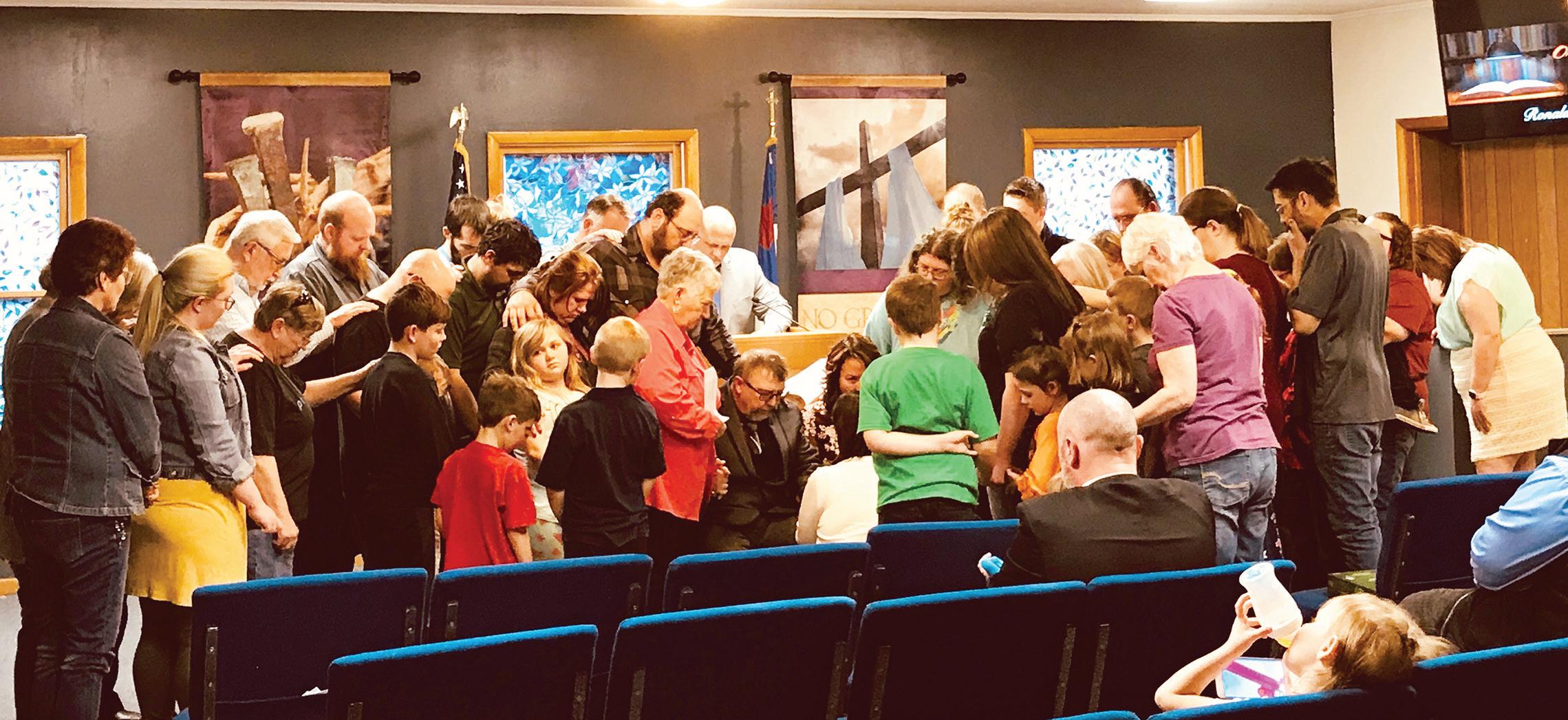
Welcome
Steve Neill is serving as IBSA’s zone consultant in Zone 9, relating to Nine Mile, Salem South, Franklin, Goshen Trail, and Greater Wabash Associations. He recently retired from First Baptist Church in Waterloo, where he served as pastor for more than 14 years. Steve and his wife, Sharon, served as International Mission Board missionaries in Africa, and have four grown sons.
Brian Fuller is the new pastor at First Baptist Church of Woodlawn. He previously served as pastor of Ellis Mound Baptist Church. Fuller and his wife, Tina, are natives of Jefferson County and have been married for 36 years. They have two children and two grandkids.
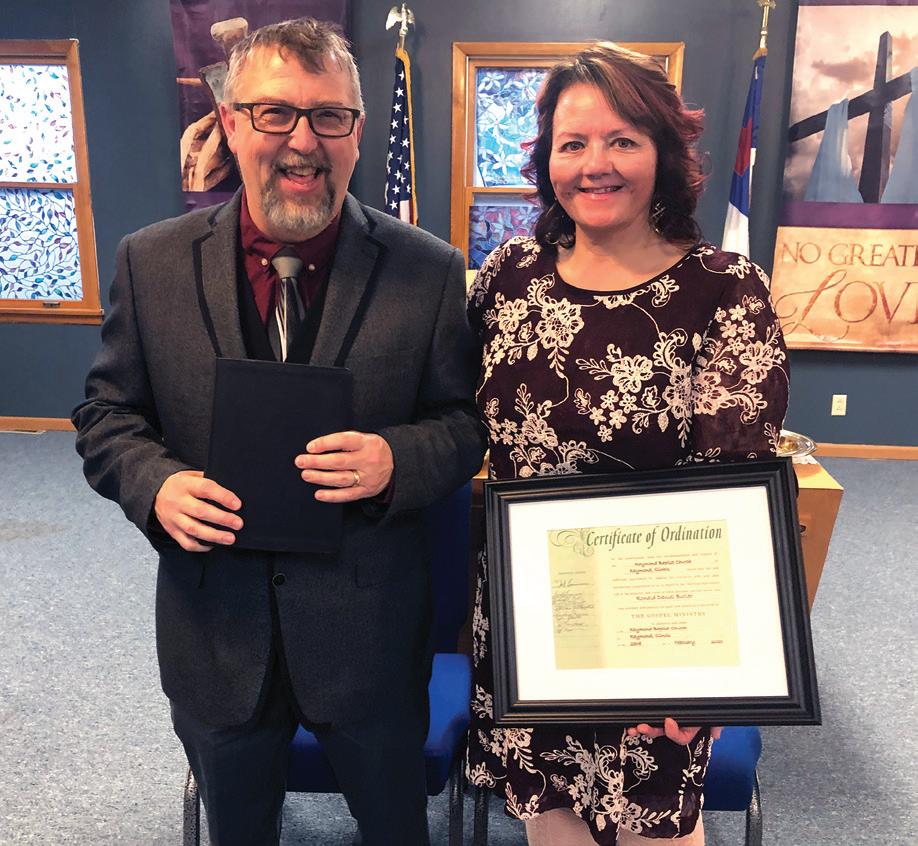

Pastor Luke Henry (foreground) and Cornerstone Baptist Church pose for a selfie after canvassing neighborhoods in Savoy with the gospel. The March project was part of Everyone Hears, a gospel saturation strategy based on five principles: Prayer, Care, Share, Disciple, Reproduce. Everyone Hears is an IBSA church planting initiative that assists churches in identifying communities that are underserved by the gospel, then leading those churches to share and ultimately start new congregations in those places.
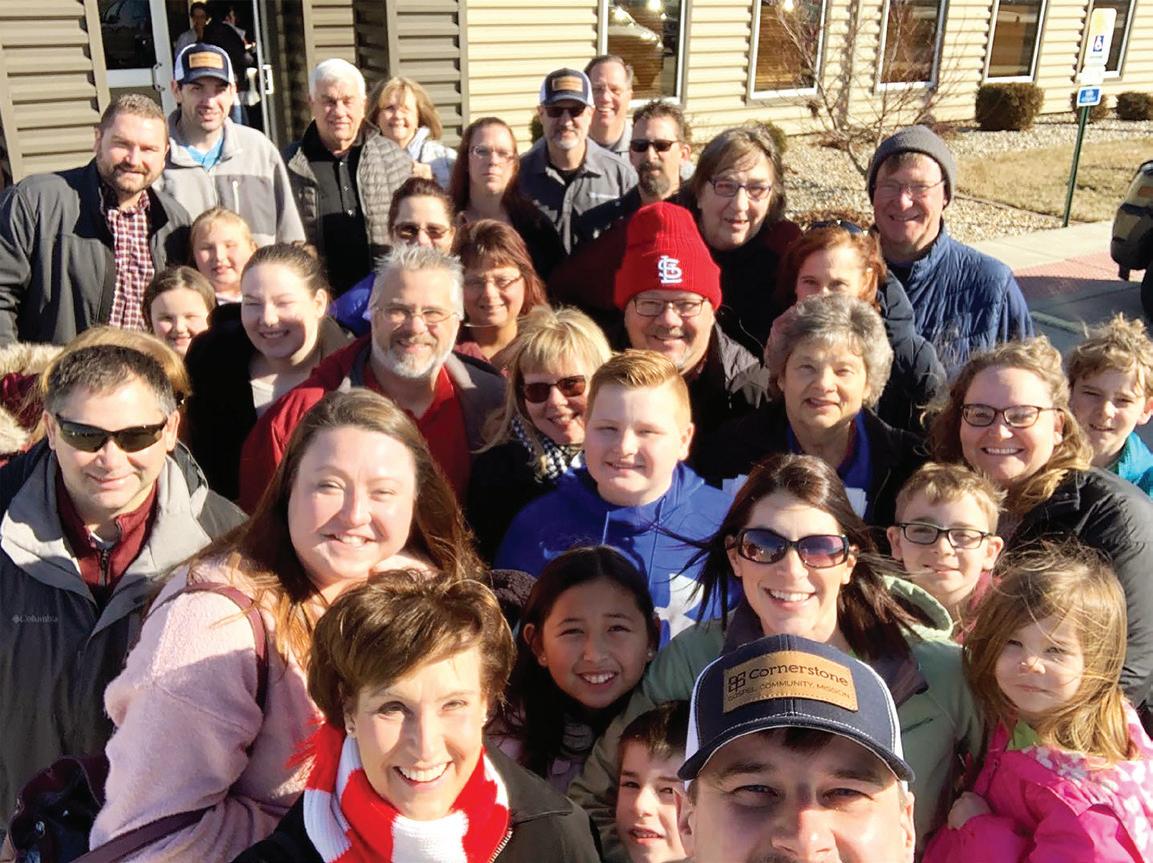
Find more information on ministry positions at IBSA. org/connect. Send NetworkiNg items to IllinoisBaptist@IBSA.org.
First Baptist Church, Effingham, is seeking a lead pastor Successful candidates will have advanced theological education, staff leadership experience, and a desire to build disciples and empower members. Send resumé to fbceffingham@gmail.com or First Baptist Church, Attention: Lead Pastor Search Committee, 213 W. Fayette Ave., Effingham, IL 62401.
Chatham Baptist Church is seeking a part-time minister of preschool to lead our preschool ministries on Sundays and Wednesdays, as well as our child development center. Submit resumés to chathambcoffice@ gmail.com by March 23.
Because of the current Coronavirus pandemic, these scheduled IBSA events are subject to change. Please consult the IBSA website or event organizer as the scheduled time draws near. IBSA will make every effort to alert attenders if the schedule changes. See more at IBSA.org.
What: Training and inspiration for this summer’s Vacation Bible School, “Concrete and Cranes,” based on five stories from the life of Jesus.
Where: Chatham Baptist Info: TammyButler@IBSA.org
What: Free, quality church leadership training in topics including discipleship, missions, age-graded ministries, worship, and more
Where: Emmanuel, Carlinville Info: TammyButler@IBSA.org
April Webinars

See page 13 for more information about each series.
April 2 - Pastor Plus: Serving the Lord’s Supper
April 9 - Leading to the Next Level
April 15 - ReVision: Create and Cast a Compelling Vision Register: IBSA.org/leadershipdevelopment
April 24-25
What: Enjoy of time of spiritual renewal and fellowship, and learn about ministry opportunities and training resources.
Where: Crowne Plaza Hotel, Springfield Register: IBSA.org/Priority
Attending more than one church is officially a thing, according to a recent Barna report on trends shaping church life and ministry. “Church hopping” is a practice of 38% of the group Barna calls “churched adults”—those who attended at least one Christian service in the last six months.
“Just
somebody might attend church doesn’t mean they attend the same church every time.”
Grades 1- 6 5 Weeks 2 locations
found at
Barna found hoppers don’t jump around as part of a regular churchgoing routine, but rather attend a different church occasionally. They’re also as likely to report weekly church attendance as churchgoers who attend the same church every week. But hopping does point to a decrease in loyalty to a single congregation, a difficult reality for pastors and church leaders. Thom Rainer recently fielded questions on his blog about a similarly named trend— church shopping. Church members choosing to leave one church and “shop” for another is almost always painful for church leaders, Rainer said. But it’s not always bad.
The onset of church shopping can be an opportunity for church leaders to assess how they assimilate new people into their church, and how they encourage church members to view membership as sacrificial, rather than with a consumer mindset. Take it to the Lord, Rainer said.
“Seek him to understand how to deal with departing members. Don’t worry about pleasing everyone as long as you are striving to please him.”
For “practicing Christians” who attend church at least monthly and say their faith is very important in their life, the share of church hoppers is smaller at 27%, but still significant. – From Barna, ThomRainer.com
because
– Barna Research